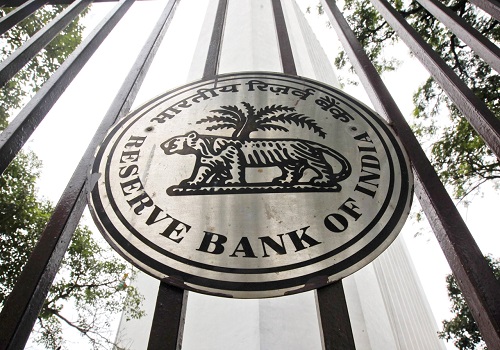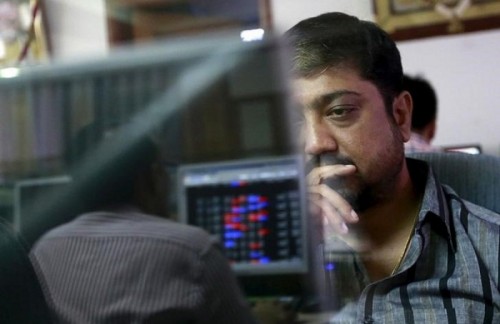Benchmarks end lower for third consecutive day on Monday

Follow us Now on Telegram ! Get daily 10 - 12 important updates on Business, Finance and Investment. Join our Telegram Channel
Indian equity benchmarks ended lower for the third consecutive day on Monday, amid selling in Finance, Capital Goods, Banking and FMCG stocks. Key gauges had a weak start and selling was accentuated throughout the session, as traders remained cautious with a private report that in view of inflationary concerns, the Reserve Bank is likely to maintain the status quo on key policy rates in its next bi-monthly economic policy, which will be the first after the presentation of the Union Budget for 2022-23. Some concern also came as rating agency Moody’s Investors Service said Indian economy’s fiscal strength is unlikely to improve in the medium term, thus remaining a key credit challenge compared with peers, even as the FY23 budget’s focus on capital expenditure will support near-term growth.
The sharp fall in the market also attributed to persisting selling by the foreign institutional investors (FIIs). Foreign portfolio investors (FPIs) pulled out as much as Rs 6,834 crore from Indian markets in the first four trading sessions of February. As per depositories data, FPIs took out Rs 3,627 crore from equities, Rs 3,173 crore from the debt segment and Rs 34 crore from hybrid instruments. FIIs remained net sellers in the capital market, as they sold shares worth Rs 2,267.86 crore on Friday. Some anxiety also came with RBI data showed that the country’s foreign exchange reserves declined by $4.531 billion to stand at $629.755 billion in the week ended January 28. In the previous week ended January 21, the reserves had decreased by $678 million to $634.287 billion. It touched a lifetime high of $642.453 billion in the week ended September 3, 2021. Traders overlooked Commerce and Industries Minister Piyush Goyal stating that promoting exports through subsidies has not really given the desired results, but the government's RoDTEP (Remission of Duties and Taxes on Export Products) scheme is helping grow exports which is expected to reach a record $400 billion this year.
On the global front, Asian markets finished mostly in green on Monday with continued spike in crude oil prices and as traders reacted to much better than expected U.S. employment data, which is good for economic recovery but spurred concerns for the outlook on interest rates. Investors shrugged off the latest survey from Caixin showing that China's services sector expanded at a slower pace in January. The corresponding PMI dropped to 51.4 from 53.1 in December. The composite index slipped to 50.1 in January from 53.0 in December. European markets were trading mostly in green, as investors shrugged off data showing that German industrial production declined unexpectedly in December. Industrial output dropped 0.3 percent month-on-month, in contrast to the 0.3 percent rise in November, Destatis reported. This was the first fall in three months. Economists had forecast a monthly growth of 0.4 percent.
Back home, on the sectoral front, hotel industry stocks were in focus as India Ratings and Research (Ind-Ra) said Covid-19's third wave is expected to have a benign impact on the hotel industry due to lesser restrictions along with the sector's pro-active preparation. Oil & gas, and aviation industry stocks also were in limelight as Finance Minister Nirmala Sitharaman said the Centre will move the issue of bringing aviation turbine fuel (ATF) under the GST net for discussion in the next meeting of the GST Council, as rising global fuel prices are a concern.
Finally, the BSE Sensex fell 1023.63 points or 1.75% to 57,621.19 and the CNX Nifty was down by 302.70 points or 1.73% to 17,213.60.
The BSE Sensex touched high and low of 58,707.76 and 57,299.05, respectively. There were 5 stocks advancing against 25 stocks declining on the index.
The broader indices ended in red; the BSE Mid cap index fell 1.25%, while Small cap index was down by 0.75%.
The few gaining sectoral indices on the BSE were Utilities up by 0.97%, Power up by 0.69% and Metal up by 0.11%, while Finance down by 2.30%, Capital Goods down by 2.13%, Bankex down by 1.87%, FMCG down by 1.70% and Telecom down by 1.69% were the losing indices on BSE.
The top gainers on the Sensex were Power Grid Corporation up by 1.88%, NTPC up by 0.67%, Tata Steel up by 0.57%, SBI up by 0.57% and Ultratech Cement up by 0.32%. On the flip side, HDFC Bank down by 3.65%, Larsen & Toubro down by 3.20%, Bajaj Finance down by 3.15%, Bajaj Finserv down by 2.94% and HDFC down by 2.93% were the top losers.
Meanwhile, India Ratings and Research (Ind-Ra) has said covid-19's third wave is expected to have a benign impact on the hotel industry due to lesser restrictions along with the sector's pro-active preparation. According to the ratings agency, the impact across the sector will be lower because of lesser restrictions by Central and state governments than in the first and second waves.
Moreover, it stated as witnessed during the first two waves, the ebbing of the infection wave starts from metro cities; therefore, the minimal restrictions by the government and self-restrictions by the people will start blurring away in a couple of months.
Besides, it pointed out that unlike the first two waves, the overall impact will be benign due to the pro-active preparation by the sector in terms of cost cutting during the times when the cases begin to rise. However, it cited that recovery of the sector will be more protracted and patchier than its base case. It assumed near normal occupancy in FY23 but mass cancellation of planned events on the back of limits on number of attendees will impact the sector.
The CNX Nifty traded in a range of 17,536.75 and 17,119.40 and there was 8 stocks advancing against 42 stocks declining on the index.
The top gainers on Nifty were Power Grid Corporation up by 1.86%, ONGC up by 1.30%, Tata Steel up by 0.74%, NTPC up by 0.71% and SBI up by 0.68%. On the flip side, Tata Consumer Product down by 3.87%, Larsen & Toubro down by 3.55%, HDFC Bank down by 3.47%, Britannia Industries down by 3.37% and HDFC Life Insurance down by 3.36% were the top losers.
European markets were trading mostly in green; UK’s FTSE 100 increased 16.57 points or 0.22% to 7,532.97 and Germany’s DAX increased 20.38 points or 0.13% to 15,119.94, while France’s CAC decreased 3.94 points or 0.06% to 6,947.44.
Asian markets finished mostly in green on Monday, with the increased risk appetite in the global markets followed by robust corporate earnings and an upbeat jobs data of January. Technical buying after at prevailing levels also supported investments. However, the trade was volatile in the session as bets over Federal rate hikes firmed with the better than expected US Jobs data. Chinese stocks rallied as it reopened after a week long holiday for Lunar New Year. Meanwhile, PMI of China posted a decline to 51.4 from 53.1 in December. Japanese stocks settled lower in the session amid disappointing earnings results and surging restrictions associated with the rising covid cases.










Tag News

Weekly Market Analysis : Markets strengthened recovery and gained nearly 2% in the passing w...





 320-x-100_uti_gold.jpg" alt="Advertisement">
320-x-100_uti_gold.jpg" alt="Advertisement">








